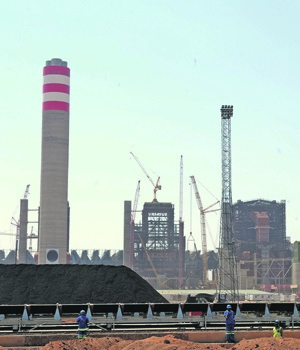
By Friday afternoon, there had still not been any talks between Eskom’s contractors and the National Union of Metalworkers of SA (Numsa), the majority union at Medupi.
The unprotected strike now involving most of the 15 575 workers on site started on March 25, and will likely lead to further delays of Eskom’s build programme.
The strike is unprotected and a court order to that effect has been roundly ignored by strikers, half of whom belong to Numsa.
Their demands relate not only to a R10 000 exit bonus once work on the first Medupi unit is done, but also a living-out allowance to help workers leave hostels.
Technically, the contractors are now free to fire the entire workforce. According to Numsa’s energy head, Steve Nhlapo, there has been zero communication between the union and the three major contractors who employ the Medupi workforce.
Eskom’s acting CEO, Brian Molefe, let slip last month, almost as an aside, that the schedule for Medupi and Kusile power stations, and the Ingula Pumped Storage Scheme have already been significantly pushed out since the last estimates in January.
New dates were given in a presentation to the parliamentary portfolio committee on public enterprises.
Medupi’s first unit, Unit 6, was meant to be synchronised by the end of last year. It ultimately got going in March this year.
Until now, Eskom has indicated that the second Medupi unit (Unit 5) will get synchronised about six to nine months after the first.
That’s no longer true – Eskom is now looking to the first half of 2017 to get the unit synchronised, inexplicably adding almost a year to the deadline.
In June last year, Eskom still predicted that Kusile’s first unit would get synchronised before March 2016.
It repeated this date in September, and in November still reported that the unit is “on track for first synchronisation in December 2015”.
By January this year, Eskom had shifted the goalpost to the “first half of 2017”.
Now, in Molefe’s presentation, this milestone has been moved to the “second half of 2017”. That technically means a new postponement of anything between six and 12 months.
The same goes for the Ingula Pumped Storage Scheme.
In June last year, Eskom predicted synchronising its Unit 3 in the second half of this year. That was after a delay caused by a fatal accident that killed six workers.
In November last year, Eskom said that the date had shifted to the first half of 2016.
Now the Ingula unit is predicted to be synchronised in the second half of 2016, according to Molefe’s presentation.
These, and all the previous delays, were blamed on strikes. Even before the current strike at Medupi, labour unrest had cost Eskom 18 months of work on the stations, according to Molefe’s presentation.
On Friday, Joseph Mathunjwa (pictured), president of the Association of Mineworkers and Construction Union (Amcu), told members in Orkney that the union still does not regard the Chamber of Mines as a real bargaining forum.
Amcu held its Workers’ Day rally in the Free State on the eve of wage talks this month.
Amcu was not entering the talks with the intention to strike, but the mines’ response would determine if it came to that, Mathunjwa said.
Amcu’s demands would be formally announced soon, he said.
The National Union of Mineworkers (NUM) this week lashed out at Amcu, which displaced it as the dominant force in the platinum belt in 2013.
It claims that Amcu “colluded” with Anglo Platinum to retrench 474 workers at the Khomanani mine in the heart of Anglo’s Rustenburg complex.
The allegation stems from the 2013 agreement to end a strike Amcu had led to protest against the platinum giant’s plans to retrench more than 3 000 workers as part of its restructuring of the Rustenburg operations.
Anglo had originally announced a plan that would have cut 14 000 jobs, but the number was eventually negotiated down.
Amcu did, however, sign a deal committing it to not challenge whatever smaller amount of retrenchments were later still deemed necessary by Anglo.
Wage talks in the public sector have been extended by a week, raising hopes that a settlement might be on the horizon.
On Friday, the unions and the government negotiators agreed to extend their mediated talks at the Commission for Conciliation, Mediation and Arbitration (CCMA) until May 11. The initial deadline had been tomorrow.
There has been no indication that the parties have moved from the positions they held when the mediation started. The state was offering a 5.8% increase, while the major Cosatu-aligned unions were demanding 10%




 Publications
Publications
 Partners
Partners








